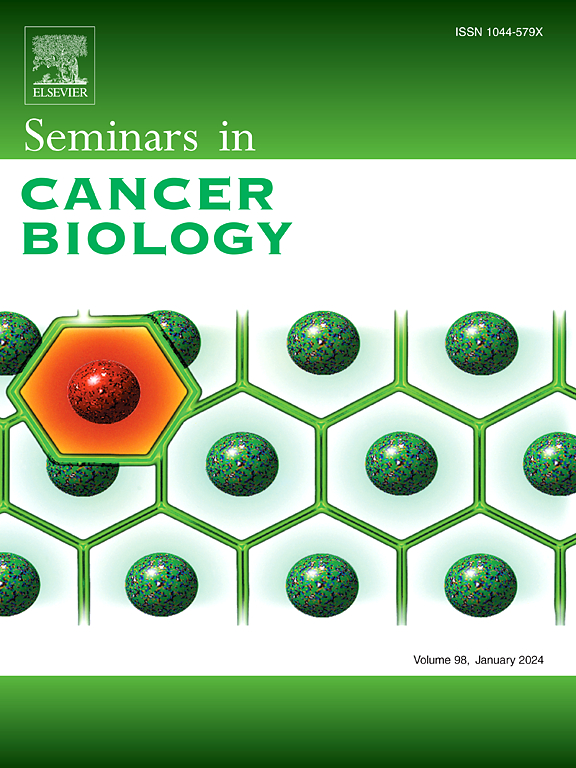炎症和肿瘤免疫逃逸是对DNA损伤的反应
IF 12.1
1区 医学
Q1 ONCOLOGY
引用次数: 0
摘要
衰老细胞和癌细胞具有共同的炎症特征,包括衰老相关分泌表型(SASP)和环GMP-AMP合成酶(cGAS)-干扰素基因刺激因子(STING)通路的因素。肿瘤微环境中的炎症不仅为免疫细胞攻击癌细胞提供了机会,而且促进了癌细胞的侵袭和转移。免疫检查点分子PD-L1是由炎症转录诱导的,PD-L1阳性肿瘤的免疫状态影响免疫检查点抑制剂(ici)的疗效。ICIs对pd - l1阳性的“热”肿瘤有效;然而,表达PD-L1的非免疫活性“冷”肿瘤很少对ICIs有反应,这表明将PD-L1阳性的“冷”肿瘤转化为“热”肿瘤可以提高ICIs的疗效。为了通过先天免疫系统消除癌症,必须建立一种控制炎症反应的治疗策略。迄今为止,炎症诱导肿瘤发生的分子机制尚未完全了解。然而,越来越清楚的是,通过cGAS-STING通路的癌症炎症调节机制在癌症和敏感细胞中都起着重要作用。在这篇综述中,我们主要关注癌症和衰老细胞中DNA损伤引发的炎症和免疫逃逸。本文章由计算机程序翻译,如有差异,请以英文原文为准。
Inflammation and tumor immune escape in response to DNA damage
Senescent and cancer cells share common inflammatory characteristics, including factors of the senescence-associated secretory phenotype (SASP) and the cyclic GMP–AMP synthase (cGAS)-stimulator of interferon genes (STING) pathway. Inflammation in the tumor microenvironment not only provides an opportunity for immune cells to attack cancer cells, but also promotes cancer invasion and metastasis. Immune checkpoint molecule PD-L1 is transcriptionally induced by inflammation, and the immunological state of PD-L1-positive tumors influences the efficacy of Immune checkpoint inhibitors (ICIs). ICIs are effective against the PD-L1-positive “hot” tumors; however, the non-immunoactive “cold” tumors that express PD-L1 rarely respond to ICIs, suggesting that converting PD-L1-positive “cold” tumors into “hot” tumors would improve the efficacy of ICIs. To eliminate cancer via the innate immune system, a therapeutic strategy for manipulating inflammatory responses must be established. To date, the molecular mechanisms of inflammation-induced tumorigenesis are not yet fully understood. However, it is becoming clear that the regulatory mechanisms of inflammation in cancer via the cGAS-STING pathway play an important role in both cancer and sensescent cells. In this review, we focus on inflammation and immune escape triggered by DNA damage in cancer and senescent cells.
求助全文
通过发布文献求助,成功后即可免费获取论文全文。
去求助
来源期刊

Seminars in cancer biology
医学-肿瘤学
CiteScore
26.80
自引率
4.10%
发文量
347
审稿时长
15.1 weeks
期刊介绍:
Seminars in Cancer Biology (YSCBI) is a specialized review journal that focuses on the field of molecular oncology. Its primary objective is to keep scientists up-to-date with the latest developments in this field.
The journal adopts a thematic approach, dedicating each issue to an important topic of interest to cancer biologists. These topics cover a range of research areas, including the underlying genetic and molecular causes of cellular transformation and cancer, as well as the molecular basis of potential therapies.
To ensure the highest quality and expertise, every issue is supervised by a guest editor or editors who are internationally recognized experts in the respective field. Each issue features approximately eight to twelve authoritative invited reviews that cover various aspects of the chosen subject area.
The ultimate goal of each issue of YSCBI is to offer a cohesive, easily comprehensible, and engaging overview of the selected topic. The journal strives to provide scientists with a coordinated and lively examination of the latest developments in the field of molecular oncology.
 求助内容:
求助内容: 应助结果提醒方式:
应助结果提醒方式:


